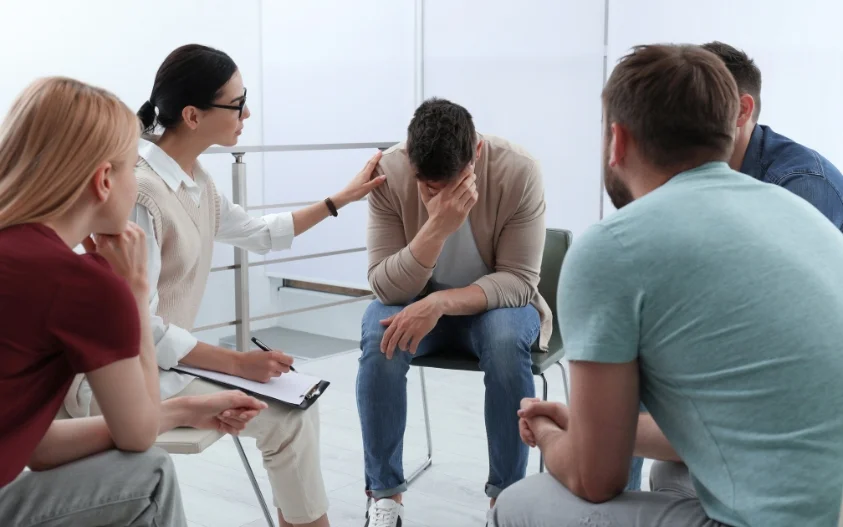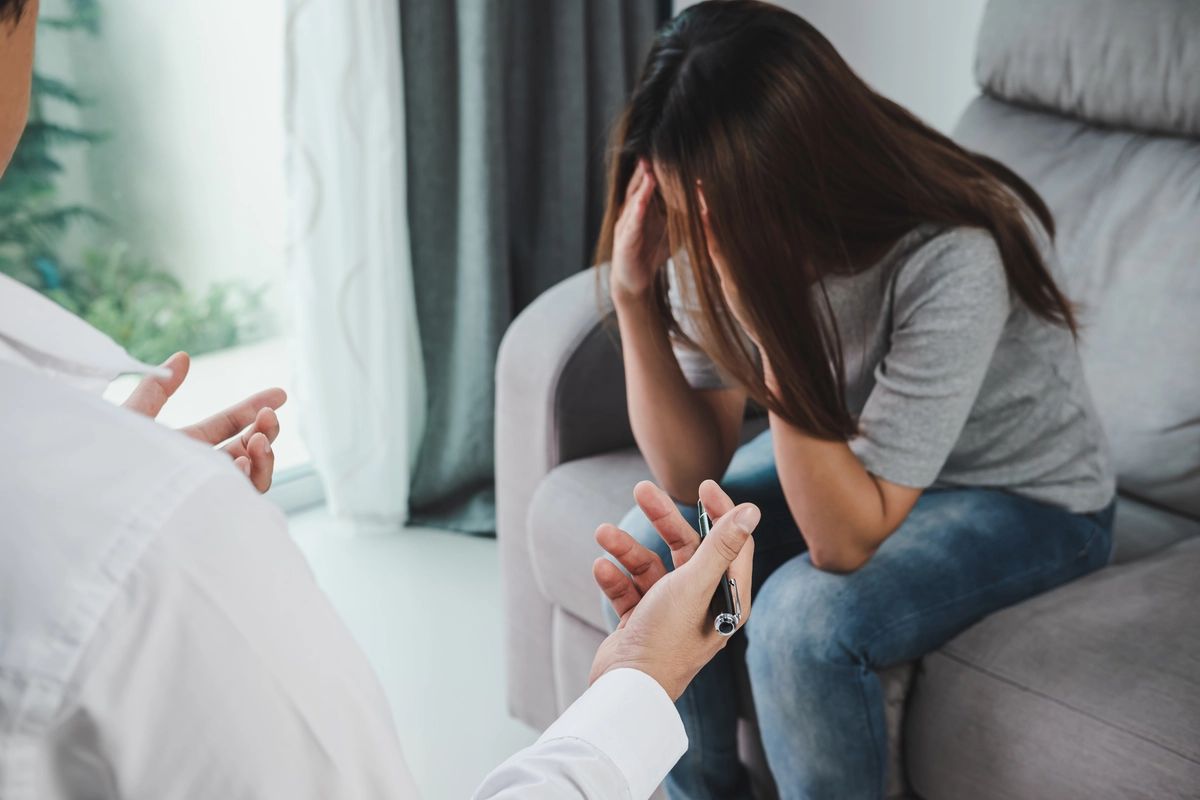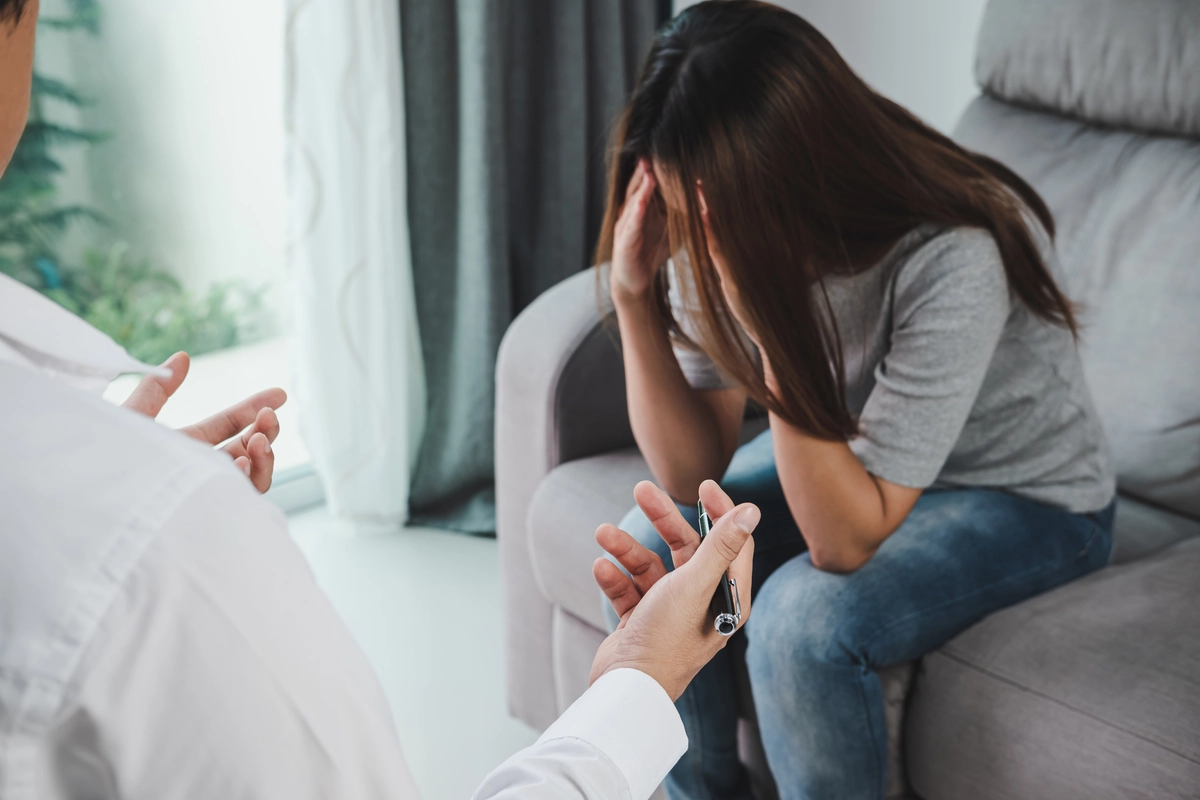24/7 Helpline:
(866) 899-221924/7 Helpline:
(866) 899-2219
Learn more about Bipolar Disorder Treatment centers in Bernalillo County

Other Insurance Options

Choice Care Network

ComPsych

CareSource

MHNNet Behavioral Health

Ceridian

Molina Healthcare

Aetna

WellPoint

WellCare Health Plans

BlueCross

UnitedHealth Group

Highmark

Absolute Total Care

CareFirst

Sliding scale payment assistance

EmblemHealth

Holman Group

UMR

Magellan

Sutter

Albuquerque Health Services NW
Albuquerque Health Services NW is a private rehab located in Albuquerque, New Mexico. Albuquerque He...

Albuquerque Behavioral Health
Albuquerque Behavioral Health offers outpatient services for individuals with a Mental Health diagno...

New Season – Albuquerque North Treatment Center
The New Season Albuquerque North Treatment Center facility is a substance abuse rehab center in Albu...

Albuquerque Treatment Services
Albuquerque Treatment Services is a public rehab located in Albuquerque, New Mexico. Albuquerque Tre...

New Season – Central New Mexico Treatment Center
New Season - Central New Mexico Treatment Center, located in Albuquerque, New Mexico, provides alcoh...

Bernalillo County – Metropolitan Assessment and Treatment
Bernalillo County – Metropolitan Assessment and Treatment is a public rehab located in Albuquerque, ...

Recovery Services of New Mexico
Recovery Services of New Mexico is an opioid addiction treatment center in Albuquerque, New Mexico. ...

Evolution Group
Evolution Group is a private rehab located in Albuquerque, New Mexico. Evolution Group specializes i...

Turning Point Recovery Center
Turning Point Recovery Center is an integrative drug and alcohol rehab in Albuquerque, New Mexico sp...

Kaseman Presbyterian Hospital – Behavioral Health Services
Kaseman Presbyterian Hospital Behavioral Health Services offers adults, children, and adolescents a ...

Sequoyah Adolescent Treatment
Sequoyah Adolescent Treatment is located in Albuquerque, New Mexico. Sequoyah Adolescent Treatment i...

University of New Mexico Childrens – Psychiatric Center
University of New Mexico Childrens – Psychiatric Center is a public rehab located in Albuquerque, Ne...

Paragon Rehabiliation
Paragon Rehabiliation is a private rehab located in Albuquerque, New Mexico. Paragon Rehabiliation s...

A New Day
A New Day is a private rehab located in Albuquerque, New Mexico. A New Day specializes in the treatm...

HopeWorks
St. Martin's Hospitality Center is located in Albuquerque, New Mexico. St. Martin's Hospitality Cent...

Duke City Recovery Toolbox
Duke City Recovery Toolbox is a private rehab located in Albuquerque, New Mexico. Duke City Recovery...

Open Skies Healthcare
Open Skies Healthcare provides behavioral health services to children and adults in need. They offer...

Rio Grande Counseling and Guidance Services
Rio Grande Counseling and Guidance Services is a private counseling clinic located in Albuquerque, N...

University Park Detox and Assessment Center
University Park Detox and Assessment Center offers distinct and highly individualized tracks like me...

Behavior Therapy Associates
Behavior Therapy Associates is a private rehab located in Albuquerque, New Mexico. Behavior Therapy ...

CFAR – Center for Family and Adolescent Research
Center for Family and Adolescent Research (CFAR) provides outpatient services for adolescents ages 1...

Recovery Services of New Mexico Isleta
Recovery Services of New Mexico Isleta is a private rehab located in Albuquerque, New Mexico. Recove...

Crossroads for Women
Crossroads is a non-profit rehab located in Albuquerque, NM. Crossroads provides housing and therape...

U Turn For Christ
U-Turn For Christ is a faith-based drug and alcohol addiction treatment program in Albuquerque, NM. ...

Shadow Mountain Recovery – Albuquerque Recovery Center
Shadow Mountain Recovery – Albuquerque Recovery Center is a private rehab located in Albuquerque, Ne...

New Mexico Solutions – Coors Boulevard
New Mexico Solutions - Coors Boulevard’ specialized staff offers a variety of counseling services fo...

Oxford House Snowheights
Oxford House Snowheights is a non-profit rehab located in Albuquerque, NM. Oxford House Snowheights ...









































































































Courageous Transformations
Courageous Transformations is an accredited, substance abuse rehab center in Albuquerque, NM for ind...

Alcoholics Anonymous
Alcoholics Anonymous is located in Albuquerque, New Mexico. Alcoholics Anonymous is a fellowship of ...

Crossroads – Maya’s Place
Crossroads – Maya’s Place is a private rehab located in Albuquerque, New Mexico. Crossroads – Maya’s...

New Horizon Counseling
New Horizon Counseling is a private rehab located in Albuquerque, New Mexico. New Horizon Counseling...

Recovery Unlimited
Recovery Unlimited is a private rehab located in Albuquerque, New Mexico. Recovery Unlimited special...

The Salvation Army – Adult Rehabilitation Program
The Salvation Army–Adult Rehabilitation Program is a comprehensive addiction treatment center for ad...

Citizens Council On Alcoholism
Citizens Council On Alcoholism is a private rehab located in Albuquerque, New Mexico. Citizens Counc...

Albuquerque Day Reporting Center
Albuquerque Day Reporting Center is a private rehab located in Albuquerque, New Mexico. Albuquerque ...

Desert Club
Desert Club is a non-profit rehab located in Albuquerque, New Mexico. Desert Club specializes in the...

Center for Behavioral Health
Albuquerque Health Services is a private rehab located in Albuquerque, NM. Albuquerque Health Servic...

Amity Foundation – Almas de Amistad
Amity Foundation – Almas de Amistad is a private rehab located in Albuquerque, New Mexico. Amity Fou...

Lifestyle Recovery
Lifestyle Recovery is a private rehab located in Albuquerque, New Mexico. Lifestyle Recovery special...

Youth Development – Behavioral Health Component
Youth Development – Behavioral Health Component is a private rehab located in Albuquerque, New Mexic...

Height’s Club
Height’s Club is a non-profit rehab located in Albuquerque, New Mexico. Height’s Club specializes in...

Youth Development – Carenas Drive Southeast
Youth Development – Carenas Drive Southeast is a private rehab located in Albuquerque, New Mexico. Y...

Youth Development – Easterday Notheast
Youth Development – Easterday Notheast is a private rehab located in Albuquerque, New Mexico. Youth ...

AA – Alcoholicos Anonimos – Grupo Tercera Tradicion
AA - Alcoholicos Anonimos - Grupo Tercera Tradicion is located in Albuquerque, New Mexico. AA - Alco...

Central New Mexico Treatment
Central New Mexico Treatment is a private rehab located in Albuquerque, New Mexico. Central New Mexi...

AA – Alcoholics Anonymous – Isleta Club
Alcoholics Anonymous (AA) - Isleta Club is located in Albuquerque , New Mexico. Alcoholics Anonymous...

AA – Alcoholicos Anonimos – Oficina Intergrupal Hispana
Alcoholicos Anonimos (AA) - Oficina Intergrupal Hispana is located in Albuquerque, New Mexico. Alcoh...

Next Step Club
Next Step Club is a private rehab located in Albuquerque, New Mexico. Next Step Club specializes in ...

La Familia – Namaste – Albuquerque
La Familia – Namaste – Albuquerque is a private rehab located in Albuquerque, New Mexico. La Familia...

A New Awakening
A New Awakening is a drug and alcohol detox center that provides substance abuse treatment located i...

Cigna Behavioral Health
Cigna Behavioral Health is a private rehab located in Albuquerque, New Mexico. Cigna Behavioral Heal...

Crossroads for Women – Hope House
Crossroads for Women - Hope House is a transitional house for women in recovery from substance abuse...

Pathways
Pathways is a private rehab located in Albuquerque, New Mexico. Pathways specializes in the treatmen...

New Mexico Monitored Treatment Program (MTP)
New Mexico Monitored Treatment Program (MTP) is a private rehab located in Albuquerque, New Mexico. ...

ESH Recovery Home
ESH Recovery Home is a non-profit rehab located in Albuquerque, New Mexico. ESH Recovery Home specia...

Lighthouse Counseling
Lighthouse Counseling is a private rehab located in Albuquerque, New Mexico. Lighthouse Counseling s...

Al Anon
Al Anon is a non-profit rehab located in Albuquerque, New Mexico. Al Anon specializes in the treatme...

AA – Alcoholics Anonymous – Foothills Group
Alcoholics Anonymous (AA) - Foothills Group is located in Albuquerque, New Mexico. Alcoholics Anonym...

Relevancy
Relevancy is a private rehab located in Albuquerque, New Mexico. Relevancy specializes in the treatm...

Age to Age Counseling PC
Age to Age Counseling PC is a private rehab located in Albuquerque, New Mexico. Age to Age Counselin...

Therapeutic Living Services – TLS
Therapeutic Living Services - TLS is a non-profit rehab located in Albuquerque, NM. Therapeutic Livi...

Age to Age Counseling
Age to Age Counseling is a private rehab located in Albuquerque, New Mexico. Age to Age Counseling s...

New Mexico Corrections Department – Women’s Recovery Academy
The New Mexico Women's Recovery Academy (NMWRA), a segment of ShareNM, stands proudly in Albuquerque...

Desert Hills of New Mexico
Desert Hills of New Mexico is a private rehab located in Albuquerque, NM. Desert Hills of New Mexico...

FreshPath Ministry
FreshPath Ministry is a non-profit rehab located in Albuquerque, NM. FreshPath Ministry currently op...

Native American Pueblo – Parent Resources
Native American Pueblo – Parent Resources is a private rehab located in Albuquerque, New Mexico. Nat...

PB&J Family Services
PB&J Family Services is a non-profit rehab located in Albuquerque, NM. PB&J Family Services is desig...












































